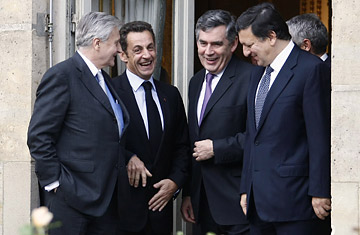
From left: European Central Bank president Jean-Claude Trichet, French President Nicolas Sarkozy, British Prime Minister Gordon Brown, and E.U. commission president Jose Manuel Barroso are seen during a crisis summit at the Elysee palace in Paris, Sunday,
In their infinite wisdom, European governments have now decided that letting the state effectively get control of ailing banks is the way out the current financial mess. But the French government really messed up the last time it had control of a chunk of the nation's banking system. That was when President Francois Mitterrand nationalized banks in the 1980s. In fact, for a good part of the 1990s, the French budget was knocked sideways because of the losses incurred at just one state-run bank, Credit Lyonnais. The German state's track record in banking isn't much better. Regional governments own some of the dogs of the industry, like WestLB, and even the federal government isn't a brilliant manager. Last month, on the very day Lehman Brothers filed for bankruptcy, state-owned KfW sent a check to Lehman in New York for $466 million — earning itself the title "Germany's dumbest bank" bestowed by the biggest circulation tabloid, Bild-Zeitung.
Yet that kind of state involvement is a central part of the European bailout plans, which involve governments recapitalizing banks in trouble in exchange for a slice of equity. In plain English, that's called partial renationalization. How much equity depends on the size of the bailout, and for the moment, other than in Britain, precise details about which banks will receive how much and in exchange for what remain to be negotiated. Along with the fresh capital, governments are proposing a series of other measures designed to restore confidence in the banking system by guaranteeing deposits, jump-starting interbank lending, which has dried up, and promising that no European bank will fail. The measures were coordinated in principle at a European Union emergency summit meeting on Sunday and announced in detail by several national governments on Monday.
Markets loved it, and have rebounded. And the Europeans are feeling pretty good about it all, especially French President Nicolas Sarkozy, who got the various governments to agree on a coordinated plan after two weeks of nasty bickering. Built into the European bailout is a subtle but unmistakable anti-American touch. For the Europeans are taking a very different tack from the U.S. in mounting their bailout, and quite deliberately so: they think U.S. Treasury Secretary Hank Paulson badly messed up his bailout.
Here's their take: it was a big mistake to allow Lehman Brothers to fail, because that just sparked panic in the banking world and led to a seizure of the global system. And they also believe that the $700 billion bailout plan was badly misdirected because it didn't set out to recapitalize the banks in a swift and clear fashion, but rather aimed to buy up the portfolios of toxic assets, which would be far more complicated and time-consuming. Paulson himself is now changing tack and looking to inject money directly into U.S. banks, too, which of course makes the Europeans feel even better about their plan.
Much of the griping has been taking place anonymously, so as not to cause political ructions. But not all of it. France's Finance Minister Christine Lagarde told French radio shortly before last weekends G7 summit: "As soon as you let one domino fall, the rest risk crashing down." She didn't exonerate Lehman — "there were certainly bad decisions taken by that bank, bad management," she said. But under the present panicky conditions, no bank should be allowed to go under. That's the motto the Europeans have adopted as part of their plan.
Will the European plans work? There is one hopeful precedent, in Sweden, which in the early 1990s solved its own banking crisis by guaranteeing deposits, injecting huge amounts of liquidity into the banking system via the central bank, and forcing banks to write down the value of their assets very quickly. In describing why that bailout worked, Urban Baeckstroem, the former Swedish central bank president who played a central role in the rescue, has identified some other vital measures. The first is that the Swedish government quickly moved to clean up government finances at the same time as it bailed out the banks. The second is that monetary policy was tightened. And the third is that there was a broad national consensus over the plan, which helped to make it a success.
There hasn't been any talk of any of that in all the weekend excitement in Europe. And of course it's bad form to ask whether governments across the continent have learned any lessons from their appalling mismanagement of banks in the past. Far easier just to bash those ugly Americans, who caused all the problems in the first place.
